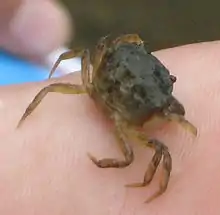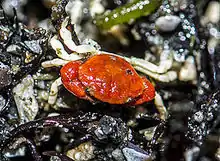Panopeidae
The Panopeidae are a family containing 26 genera of morphologically similar crabs, often known as "mud crabs". Their centers of diversity are the Atlantic Ocean and eastern Pacific Ocean.
| Panopeidae | |
|---|---|
 | |
| Dyspanopeus sayi | |
| Scientific classification | |
| Kingdom: | Animalia |
| Phylum: | Arthropoda |
| Subphylum: | Crustacea |
| Class: | Malacostraca |
| Order: | Decapoda |
| Infraorder: | Brachyura |
| Superfamily: | Xanthoidea |
| Family: | Panopeidae Ortmann, 1893 [1] |
| Synonyms [2] | |
|
Eucratopsidae Stimpson, 1871 (nom. rej.) | |

Distribution
Most members of the family Panopeidae live in the Atlantic Ocean or eastern Pacific Ocean. Only one species occurs in Australian waters – Homoioplax haswelli.[2]
Ecology
The various genera of the Panopeidae are morphologically similar, partly as a result of many instances of convergent evolution to similar habitats and food preferences.[3]
Crabs of the family Panopeidae are all free-living (not commensal or parasitic),[2] and typically live in soft-bottomed parts of the ocean,[3] lending them the common name "mud crabs" (a name also shared by other organisms). They burrow into the sediment and feed on a variety of marine invertebrates.[3]
Genera
The World Register of Marine Species lists these subfamilies and genera:[1]
Eucratopsinae Stimpson, 1871
- Chasmophora Rathbun, 1914
- Cycloplax Guinot, 1969
- Cyrtoplax Rathbun, 1914
- Eucratopsis Smith, 1869
- Glyptoplax Smith, 1870
- Homoioplax Rathbun, 1914
- Malacoplax Guinot, 1969
- Odontoplax Garth, 1986
- Panoplax Stimpson, 1871
- Prionoplax H. Milne-Edwards, 1852
- Robertsella Guinot, 1969
- Tetraplax Rathbun, 1901
- Thalassoplax Guinot, 1969
Panopeinae Ortmann, 1893
- Acantholobulus Felder & Martin, 2003
- Dyspanopeus Martin & Abele, 1986
- Eurypanopeus A. Milne-Edwards, 1880
- Eurytium Stimpson, 1859
- Hexapanopeus Rathbun, 1898
- Lithopanopeus Felder & Thoma, 2020[4]
- Lophopanopeus Rathbun, 1898
- Lophoxanthus A. Milne-Edwards, 1879
- Metopocarcinus Stimpson, 1860
- Neopanope A. Milne-Edwards, 1880
- Panopeus H. Milne-Edwards, 1834
- Rhithropanopeus Rathbun, 1898
- Tetraxanthus Rathbun, 1898
References
- Davie, P. (2015). "Panopeidae Ortmann, 1893". WoRMS. World Register of Marine Species. Retrieved 2015-07-03.
- P. J. F. Davie (2002). "Panopeidae". Crustacea: Malocostraca: Eucarida (Part 2), Decapoda: Anomura, Brachyura. Zoological Catalogue of Australia. 19. Canberra, Australia: CSIRO Publishing. pp. 372–374. ISBN 978-0-643-06792-9.
- C. D. Schubart, J. E. Neigel & D. L. Felder (2000). "Molecular phylogeny of mud crabs (Brachyura: Panopeidae) from the northwestern Atlantic and the role of morphological statis and convergence" (PDF). Marine Biology. 137 (1): 11–18. doi:10.1007/s002270000325.
- Felder, Darryl L.; Thoma, Brent P. (2020-09-03). "A new genus and species of mud crab (Crustacea, Brachyura, Panopeidae) from shoreline waters of the western Gulf of Mexico". Zootaxa. 4845 (3): 425–435. doi:10.11646/zootaxa.4845.3.7. ISSN 1175-5334.
| Wikimedia Commons has media related to Panopeidae. |